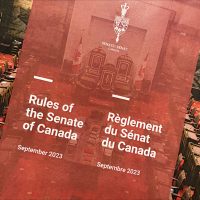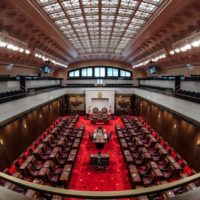Senate Renewal
Jusqu’ici, tout va bien
Maintenant qu’il est engagé sur la voie de l’indépendance, le Sénat doit décider comment il mènera sa barque, dit l’ancien sénateur Jack Austin.
Cet éditorial par l’ancien sénateur Jack Austin fait partie d’une série d’articles rédigés par d’anciens sénateurs sur le renouvellement du Sénat.
Lorsque le Sénat de plus en plus indépendant reprendra ses travaux, à l’automne, une nette majorité des sénateurs n’aura aucun lien avec un parti politique particulier. Il s’agit d’une transition déterminante pour la Chambre haute, car elle marque la fin d’une première étape importante dans la réforme de l’institution.
Il reste cependant une étape clé à franchir dans l’évolution du Sénat : les sénateurs doivent en effet expliquer à la population canadienne comment un Sénat en partie indépendant gérera le processus législatif. Ces considérations bureaucratiques sont importantes, car la population a besoin de connaître les lignes directrices qui s’appliqueront pour maintenir et renforcer sa confiance dans cette institution en pleine évolution.

L’ancien sénateur Jack Austin discute le renouvellement du Sénat.
Permettez-moi d’abord de dire que l’abandon de la partisanerie excessive qui a mené à cette nouvelle réalité est dû en grande partie à la décision du premier ministre Justin Trudeau de nommer uniquement des sénateurs indépendants. Je crois que cette mesure a transformé la façon dont les Canadiens perçoivent le Sénat et changé le ton adopté par les médias pour parler de la Chambre haute.
Elle a aussi eu d’autres répercussions positives.
Par exemple, depuis l’annonce du nouveau système de nomination, à la fin de 2015, un quart des projets de loi du gouvernement ont été modifiés avec succès par le Sénat : c’est là une différence importante par rapport à ce que l’on a observé au cours du mandat du gouvernement précédent. Cela ne veut pas dire que les sénateurs étaient passifs auparavant ; en mon temps, les débats sur les textes de loi étaient tout aussi animés, mais ils avaient lieu à huis clos, c’est-à-dire que les sénateurs aidaient à influer sur les projets de loi pendant les réunions de leur caucus ou dans les cabinets des ministres.
Aujourd’hui, ces discussions se tiennent ouvertement et sont accessibles aux Canadiens, notamment grâce à la radiodiffusion en direct et aux transcriptions ultérieures des délibérations. Ce climat de transparence permet aux Canadiens de participer au processus parlementaire et de constater que les modifications proposées par le Sénat sont discutées et examinées à fond, même celles qui finissent par être rejetées par le gouvernement.
Enfin, cette ouverture a aussi mis en lumière le rôle du Sénat en tant qu’organe législatif soucieux d’examiner soigneusement les textes de loi et déterminé à faire en sorte que les questions d’intérêt public soient étudiées avant l’adoption de nouvelles lois.
Je crois que le public comprend de mieux en mieux le Sénat.
Toutefois, tandis que le groupe des sénateurs indépendants continue de croître en taille et en importance, il doit présenter clairement au public l’ensemble des normes et des principes qui régiront son fonctionnement en tant qu’organe législatif et consultatif. Maintenant que les sénateurs indépendants constituent une majorité, le Sénat passe à une deuxième étape cruciale de son évolution.
À mon avis, cette nouvelle majorité a des responsabilités à l’égard du régime de gouvernance dans son ensemble, et ces responsabilités doivent être expliquées à la population. J’ai servi pendant de nombreuses années comme président du Comité sénatorial du Règlement et, en cette qualité, je crois que ce dernier devrait adopter un processus pour présenter officiellement aux Canadiens ses lignes directrices sur le rendement et le comportement des sénateurs.
Par exemple, comment le nouveau Sénat gérera-t-il la création de nouveaux caucus chez les membres indépendants ? Quelles règles régiront la représentation de ces caucus dans le système si important des comités sénatoriaux ? Devrait-il y avoir des sous-caucus ? Dans un Sénat comptant des membres indépendants, comment faut-il structurer le débat pour assurer son déroulement efficace sans pour autant empiéter sur le droit des membres de prendre la parole ?
Dans l’ancien régime partisan, ces questions étaient plus facilement réglées. Les deux groupes au Sénat étaient régis par une approche descendante, et notamment par l’imposition de la discipline de parti par les whips. Cette formule ne fonctionnera plus au sein du nouveau Sénat.
Il appartient au Sénat de décider comment il répondra à ces questions, soit en adoptant des motions, soit en modifiant formellement ses règles. Les changements doivent aussi tenir compte des premiers principes. Au début, les sénateurs devront se demander comment développer les processus qui permettront aux membres de la Chambre nommée d’assumer au mieux leur responsabilité, c’est-à-dire de conseiller le gouvernement de Sa Majesté ou, en d’autres mots, le gouvernement élu de l’heure.
Il s’agit d’une tâche considérable ; tôt ou tard, il faudra codifier l’ensemble de ces processus et en décrire les différents volets dans un document.
Si cela peut paraître technique à certains, il est cependant essentiel d’engager une réflexion sur l’avenir d’un Sénat de plus en plus indépendant et de codifier le cadre normatif qui en régira le fonctionnement si l’on veut que les Canadiens sachent à quoi s’attendre dans le nouveau système. Dans le cas contraire, ils pourraient se mettre à croire que le Sénat jette aux oubliettes la responsabilité inhérente à ses procédures traditionnelles.
Jack Austin a été sénateur libéral pendant plus de 30 ans. Il a notamment servi à titre de ministre d’État dans le cabinet du premier ministre Pierre Trudeau et de leader du gouvernement de Paul Martin au Sénat. Il a pris sa retraite en mars 2007 à l’âge de 75 ans.
*Les opinions exprimées ci-dessus ne sont pas nécessairement identiques à celles du bureau du représentant du gouvernement au Sénat.





















































